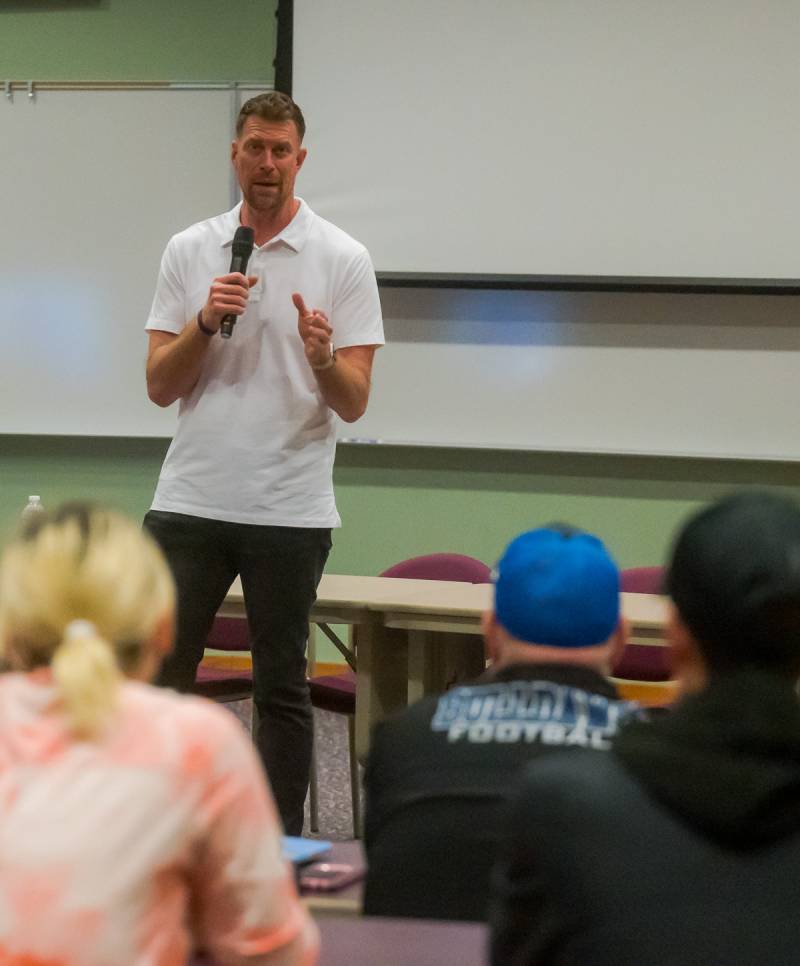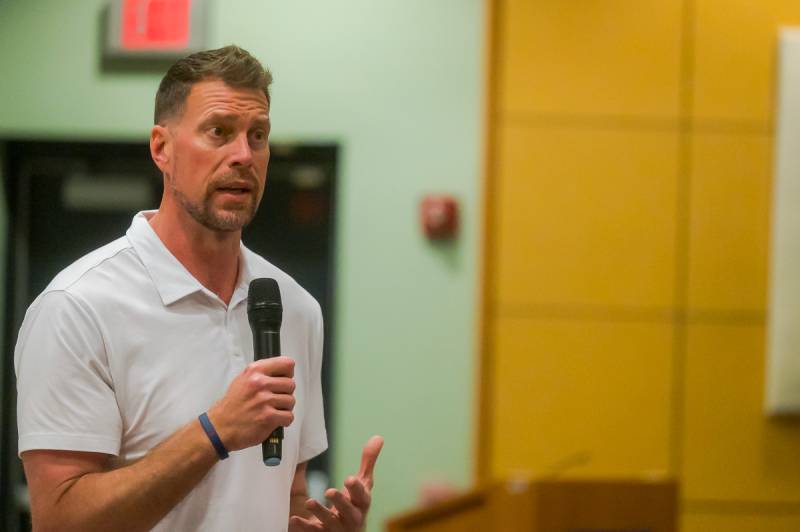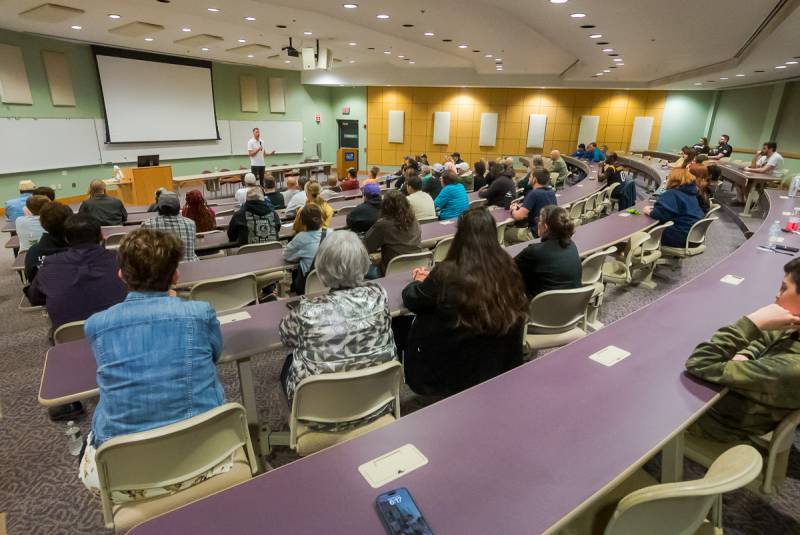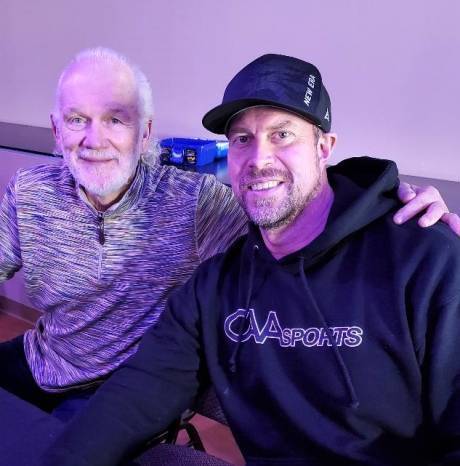Time to stop stigma surrounding mental health, substance use: Former NFL QB Ryan Leaf

Growing up in what he calls “the cowboy culture” of rural Montana, former National Football League quarterback Ryan Leaf said that he never saw another man reach out for help with mental health issues because of the stigma associated with it.
Leaf failed to live up to the expectations of the No. 2 pick in the 1998 NFL draft, leaving professional football after a relatively uneventful five seasons. He then turned to drug use, which led to his arrest and incarceration for 32 months.
Today, a week shy of his 48th birthday, he tells his story at venues throughout the nation when he’s not commentating on college football and the NFL as a radio and television host.
On Wednesday night, he capped his appearance in Batavia with a two-hour talk in front of 70 people at Genesee Community College. Earlier in the day, he spoke to about 300 high school 11th- and 12th-graders at the GCC gymnasium (see story below).
Leaf's presentations were sponsored by UConnectCare (formerly Genesee/Orleans Council on Alcoholism and Substance Abuse).
Leaf shared that he didn’t have the ability to cope with failure, instead blaming others and taking a self-righteous and “I’m better than you” attitude. He said he didn’t know where to turn when his emotional health worsened.
“I wasn’t used to seeing people being vulnerable or transparent, it's just not,” he said. “It's a huge reason why I didn't seek help because I grew up in what you would consider a cowboy culture of Montana (and) then in locker rooms in college and in the NFL where you've never seen another man simply say, ‘I'm really struggling here. Can you help me?’
“So, if we haven't seen it, what would make us think anybody would be able to do it? Right? It's not taught. What has been taught is rub some dirt on it, get it back in there, toughen up.”
He went on to say that his father, who he said he admires, told him, “Why can’t you just stop (taking the Vicodin pills that led him astray)? Yeah, if I could stop, I would have done that a long time ago. Clearly, this was not a choice. And the idea was stigma exists -- the idea that someone may know that you need help is more frightening than actually getting the help that you need.
“That's what stigma is, and it will be the last rail that you have to climb over for people to take mental health and substance abuse seriously.”
Married with two young children, Leaf, now a Connecticut resident, illustrated his point by comparing those with a medical illness with those suffering from mental illness.
“A perfect example, two kids get sick in the same neighborhood. One has leukemia and one deals with a mental health disorder or substance use disorder. The difference in comparison to how the public then treats the family of the leukemia child in terms of support, food, things of that nature in comparison to what the individual family deals with when it comes to the mental health side of things … they're ostracized, they’re isolated, they’re talked about … when in reality, there's medical science that exactly the same thing exists. It's a disease.”
Leaf, realizing that some in the audience were in recovery, credited those in attendance for coming to hear him speak.
“You had a choice to be at home, stay at home, and not do something to try to be part of the solution tonight within your community,” he said. “So, I applaud all of you and you should applaud yourselves for being able to go off and do that and be a part of it.”
As for his own life, Leaf said he was driven by competition – “my first drug of choice,” he said -- at a young age and developed into a three-sport star (basketball, football and baseball) in high school.
“I worked harder than anybody else, and so I was rewarded with the opportunity to play at any college,” he said. “I was able to get an education for free and relieve my parents of the burden of having to have to foot the bill or something like that,” he said.
He said he didn’t fit into the Montana culture and looked to escape, signing with Washington State University, where he led his team to a trip to the Rose Bowl and became a Heisman Trophy finalist in his junior year.
His collegiate success led to him being selected by the San Diego Chargers right after Peyton Manning in the 1998 NFL draft. With it came a five-year $31 million contract, including an $11.5 million signing bonus.
Despite Leaf’s extraordinary athletic talent, his dream of a long NFL career and a place in the Pro Football Hall of Fame never materialized as he was ill-equipped to handle adversity. He ended up playing for four teams before calling it quits. From there, his dependency on Vicodin led to possession and burglary charges as he continually searched for a way to ease his inner pain.
Eventually, after two years in prison, he was able to turn his life around by finally considering the plight of others around him.
“When you make it about someone else, you're not thinking about you at all, you're not thinking about your problems and your troubles with things you've dealt with, you're actually thinking about someone else's issues,” he said. “That's what empathy is … you actually put yourself in the shoes of someone else going through something. And I don't think I really had an empathetic bone in my body until I was confronted with all my stuff.
“There was no talk of mental illness or drugs or alcohol in my life when I got to the NFL because there just wasn't. It turns out that I was dealing with mental health issues. I just didn't understand it.”
Leaf compared himself to Peyton Manning, who is considered one of the greatest quarterbacks ever, as he pointed out the public’s perception of success.
“If I placed Peyton Manning right here and I stood next to him right now in front of us and asked you to point out the failure and the success, I don’t think it would be hard for anybody to do the pointing,” he said. “But that’s how people view and define success and failure.
“We’re both far removed from playing NFL football. He’s been retired for some time and I as well. If you look at our resume and our life right now, Peyton is a 48-year-old father of two and so am I. I own a profession and consulting company -- a broadcasting one a does he. We both do a ton of philanthropic things and give back to our communities. We both are very happy with our lot in life and … suffice to say, we both have the life of our dreams.”
Leaf said the “baggage” of the past doesn’t define a person’s life today and hope for the future.
“I mean a lot of people quit from that aspect of things like it will never get better. And I think it's the furthest from the truth,” he said. “It does not matter at all what has gone on in your past if you’re willing to accept that and surrender to who you are and why you're here. It's all about what you do today and tomorrow.”
Disclosure: Mike Pettinella is the publicist for UConnectCare.




